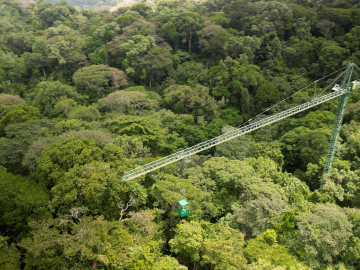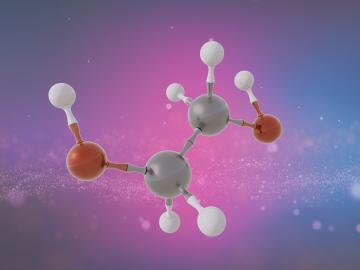
Filter News
Area of Research
- Advanced Manufacturing (9)
- Biology and Environment (39)
- Building Technologies (2)
- Computational Engineering (2)
- Computer Science (12)
- Electricity and Smart Grid (1)
- Energy Science (95)
- Energy Sciences (1)
- Functional Materials for Energy (2)
- Fusion and Fission (9)
- Fusion Energy (6)
- Isotopes (4)
- Materials (67)
- Materials Characterization (2)
- Materials for Computing (13)
- Materials Under Extremes (1)
- Mathematics (1)
- National Security (6)
- Neutron Science (14)
- Nuclear Science and Technology (14)
- Nuclear Systems Modeling, Simulation and Validation (1)
- Quantum information Science (4)
- Supercomputing (33)
- Transportation Systems (2)
News Type
News Topics
- (-) Clean Water (14)
- (-) Computer Science (70)
- (-) Environment (67)
- (-) Materials (70)
- (-) Materials Science (54)
- (-) Nuclear Energy (36)
- (-) Security (4)
- (-) Transportation (52)
- 3-D Printing/Advanced Manufacturing (57)
- Advanced Reactors (18)
- Artificial Intelligence (33)
- Big Data (26)
- Bioenergy (26)
- Biology (31)
- Biomedical (18)
- Biotechnology (6)
- Buildings (31)
- Chemical Sciences (31)
- Composites (16)
- Coronavirus (15)
- Critical Materials (13)
- Cybersecurity (9)
- Emergency (2)
- Energy Storage (50)
- Exascale Computing (11)
- Fossil Energy (1)
- Frontier (10)
- Fusion (19)
- Grid (28)
- High-Performance Computing (33)
- Hydropower (6)
- Irradiation (3)
- Isotopes (15)
- ITER (5)
- Machine Learning (19)
- Mathematics (3)
- Mercury (3)
- Microscopy (21)
- Molten Salt (6)
- Nanotechnology (25)
- National Security (13)
- Neutron Science (42)
- Partnerships (11)
- Physics (11)
- Polymers (15)
- Quantum Computing (9)
- Quantum Science (18)
- Simulation (16)
- Software (1)
- Space Exploration (11)
- Statistics (1)
- Summit (11)
Media Contacts

Researchers led by the University of Melbourne, Australia, have been nominated for the Association for Computing Machinery’s 2024 Gordon Bell Prize in supercomputing for conducting a quantum molecular dynamics simulation 1,000 times greater in size and speed than any previous simulation of its kind.

Researchers have developed and 3D printed the lightest crack-free alloy capable of operating without melting at temperatures above 2,400 degrees Fahrenheit, which could enable additively manufactured turbine blades to better handle extreme temperatures, reducing the carbon footprint of gas turbine engines such as those used in airplanes.

ORNL researchers were honored with a prestigious ACE Award for Composites Excellence by the American Composites Manufacturers Association. The team won the “innovation in green composites design” prize for creating a fully recyclable, lightweight wind turbine blade tip that incorporates low-cost carbon fiber and conductive coating for enhanced protection against lightning strikes.

Three transportation researchers at the Department of Energy’s Oak Ridge National Laboratory have been elevated to senior member grade of the Institute of Electrical and Electronics Engineers, or IEEE.

Scientists using high-resolution aerial scans and computational modeling concluded that wildfires, storms and selective logging have become key drivers behind rainforest carbon emissions, outpacing clear-cutting practices.

ORNL has partnered with Western Michigan University to advance intelligent road infrastructure through the development of new chip-enabled raised pavement markers. These innovative markers transmit lane-keeping information to passing vehicles, enhancing safety and enabling smarter driving in all weather conditions.

Benjamin Manard, an analytical chemist in the Chemical Sciences Division of the Department of Energy’s Oak Ridge National Laboratory, will receive the 2024 Lester W. Strock Award from the Society of Applied Spectroscopy.

A research team led by the Department of Energy’s Oak Ridge National Laboratory demonstrated an effective and reliable new way to identify and quantify polyethylene glycols in various samples.

Researcher Rocio Uria-Martinez was named one of four “Women with Hydro Vision” at this year’s HYDROVISION International 2024 conference taking place in Denver this week. Awarded by a committee of industry peers, the honor recognizes women who use their unique talents and vision to improve and advance the worldwide hydropower industry.

Oak Ridge National Laboratory scientists have developed a method leveraging artificial intelligence to accelerate the identification of environmentally friendly solvents for industrial carbon capture, biomass processing, rechargeable batteries and other applications.


